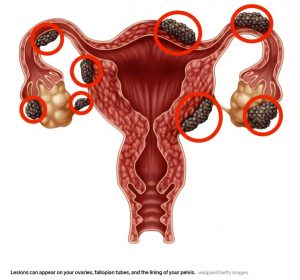Menstruation, the monthly shedding of the uterine lining, is a normal part of a woman’s life, but menstrual disorders often occur, causing disruptive physical and emotional symptoms. They can include:
- Heavy bleeding
- Abdominal cramps
- Missed periods
- Uncontrollable mood swings
It is common for most women to experience some form of discomfort before their monthly period begins, with typical symptoms of mild cramping and fatigue. These usually disappear within the first couple of days of the start of the period, but if any of the above symptoms are occurring, it could be that other issues are a factor in an abnormal menstrual cycle.
What is a Normal Period?
The average menstrual cycle for a woman is 28 days, with the average period lasting from 3 – 5 days. However, there can be huge variations from woman to woman.
A ‘normal’ menstrual cycle is different for all women as a woman’s body is unique; the same applies to her period. What might be normal for one is abnormal to another. Within a few years’ of having monthly periods, most women begin to get a feel for what is normal for them; i.e. the frequency of their period, the duration and flow.
A woman can usually tell when something out of the ordinary happens, such as a change in the flow, or spotting between periods, and so it is important to stay in tune with your body and talk to your GP or healthcare professional if you notice any significant changes to your menstrual cycle.
Common Menstrual Problems
You can experience a number of menstrual problems when having your monthly period. These include:
Heavy Bleeding (Menorrhagia)
Heavy periods cause you to bleed more than you normally would. Most women shed between 3 – 4 tablespoons of blood each month, but for those who experience heavy periods, this can be as much as 10 – 25 that amount.
It is also common to experience longer periods alongside heavy bleeding, with periods lasting beyond 7 days.
Menorrhagia is typically caused by imbalances in hormone levels, particularly oestrogen or progesterone. When bleeding is excessive, you lose iron that is needed to produce haemoglobin; a molecule that helps red blood cells transport oxygen throughout the body. Red blood cell counts drop when there is not enough iron in the body, often leading to anaemia, resulting in fatigue, pale skin and shortness of breath. It is recommended that you see your doctor if you think you could be anaemic.
Other causes of heavy menstrual bleeding include:
Missed Periods (Amenorrhoea)
Amenorrhoea refers to the absence of menstrual periods and is quite common before puberty, after menopause or during pregnancy. However, if you are not menstruating each month and do not fit into this criteria, you should discuss your condition with a healthcare professional.
There are two types of amenorrhoea: primary and secondary.
If you have not started your periods by the time you turn 16, you will likely be diagnosed with primary amenorrhoea. It is typically due to a problem with the endocrine system that regulates hormones. A number of conditions can cause amenorrhoea; these can include:
- Extreme weight loss
- Genetic abnormalities
- Disorders of the ovaries or uterus
- Delayed maturing of the pituitary gland
- An abnormality with the hypothalamus
- Stress
- Secondary Amenorrhoea
If you have had regular periods which then stop for 3 months or longer, you are experiencing secondary amenorrhoea. Causes include:
- A change in oestrogen levels
- Extreme weight loss and exercise
- Stress
- Physical illness
- Elevated levels of the hormone prolactin
- Thyroid disorders, including hypothyroidism and hyperthyroidism
- Ovarian cysts or removal of the ovaries
- Osteoporosis
The outlook for amenorrhoea varies according to what is causing it, but treatments are available to correct the underlying condition that are responsible for it.
Premenstrual Syndrome (PMS)
PMS is a term used to describe the physical and psychological symptoms associated with the menstrual cycle. It is a common condition and approximately 30 – 40% of women experience severe symptoms that affect their lifestyles.
PMS is caused by fluctuating hormone levels (oestrogen and progesterone) that can influence brain chemicals, including serotonin that affects your mood. Symptoms may also be worse if you drink alcohol at certain times during your menstrual cycle.
Premenstrual syndrome is not to be confused with common premenstrual symptoms that affect up to 75% of women. These tend to be milder and more manageable then those experienced with premenstrual syndrome. Typical symptoms of premenstrual syndrome include:
- Fatigue
- Bloating
- Swollen, painful breasts
- Headaches
- Constipation
- Inability to concentrate
- Anxiety and confusion
- Mood swings and tension
- Anger
Symptoms of PMS typically begin 5 – 7 days before your period and disappear once or soon after it begins.
Premenstrual Dysphoric Disorder (PMDD)
PMDD is much more severe than PMS, and can significantly interfere with a woman’s lifestyle. Common symptoms include:
It is unclear what causes PMDD, but it could be due to an abnormal reaction to hormone changes related to the menstrual cycle.
Studies have shown that there is a link between PMDD and low levels of serotonin. Certain brain cells that use serotonin control attention, mood, pain and sleep. Hormonal changes may cause a decrease in serotonin, resulting in symptoms of PMDD.
To diagnose PMDD, a full medical history is taken, along with a physical examination in order to rule out other conditions that have similar symptoms to that of PMDD. A symptom chart is used to determine any correlation between symptoms and the menstrual cycle. In order to obtain an accurate diagnosis, patients must experience a minimum of five symptoms, with at least one from the following:
- Mood changes or increased sensitivity
- Feelings of anger or irritability
- Heightened anxiety or tension
- Feelings of sadness or hopelessness
Bleeding Between Periods (Metrorrhagia)
Bleeding between your periods refers to any bleeding that occurs after your period ends and the next one begins. Also referred to as breakthrough bleeding, it is usually nothing of concern, particularly if it is light bleeding (spotting). However, if the bleeding is heavy, you should speak to a healthcare professional to rule out any underlying health conditions.
Typical reasons for bleeding between periods include:
- Hormonal or emergency contraception
- Sexually transmitted infections (UTIs)
- Menopause or perimenopause
- Polyps in the cervix or vagina
- Certain cancers
- Polycystic ovary syndrome
- Endometriosis
- Miscarriage or termination
Treatment will depend on the underlying cause. Keeping a record of when you experience breakthrough bleeding can help your doctor provide an accurate diagnosis.
Painful Periods (Dysmenorrhoea)
Menstrual cramps are very common in the lead up to and first couple of days of your period when your uterus is contracting. Women may experience a mild discomfort, but for some, it can cause excruciating pain. Approximately 1 in 10 women will experience pain so severe that it affects their everyday activities, resulting in time off school or work. Pain can also radiate to the lower back and top of the legs with other symptoms including:
- Nausea and diarrhoea
- Bloating
- Breast tenderness
- Fatigue
- Feeling emotional or tearful
Painful periods can be linked to an underlying medical condition so it is important to seek medical advice if your symptoms are severe. Possible conditions include:
- Fibroids
- Endometriosis
- Pelvic inflammatory pain
Outlook
It is important to remember that premenstrual symptoms affect women differently, and treatment will depend on the severity of symptoms. You can help reduce symptoms by adopting a healthy lifestyle such as:
- Stopping smoking
- Reduce stress
- Eating a healthy diet rich in fibre
- Limiting alcohol and caffeine intake
- Getting plenty of sleep
Irregularities between periods are normal and generally nothing to worry about, but if you experience severe pain or an abnormally heavy flow with blood clots, you should arrange to see your doctor of healthcare professional as soon as possible.
Need Help?
Our Consultant Gynaecologists are highly experienced in diagnosing and treating women that are currently experiencing menstrual disorders, with our medical team and nursing staff offering support in a sensitive and caring manner at all times.
To make an appointment to see a Consultant Gynaecologist consultant, please contact the reservations team on 01233 364 036 or email ashford.info@onehealthcare.co.uk
One Ashford Hospital is located in Kent and is ideal for private, insured and NHS patients located in Ashford, Dover, Canterbury, Folkestone, Maidstone and all nearby areas.
Why Choose One Ashford Hospital
• Access to leading Consultants within 48 hours*
• 0% and low interest finance options**
• Competitive fixed-price packages
• Modern purpose-built hospital
• Fast access to diagnostics including MRI, X-Ray and Ultrasound
• Private, spacious, ensuite rooms
• Specialist Physiotherapy and nursing teams
• Little waiting time for surgery
• Calm, dignified experience
*Dependent on Consultant availability
**Terms and conditions apply








 One Ashford
One Ashford One Hatfield
One Hatfield